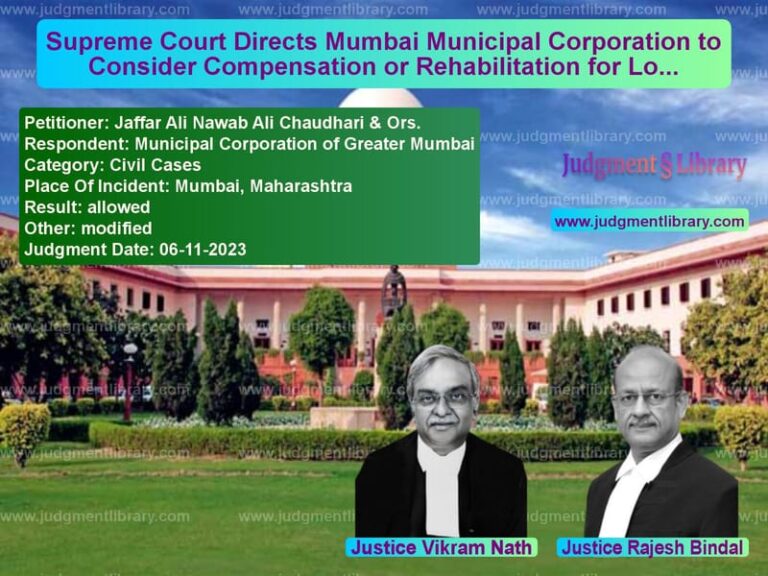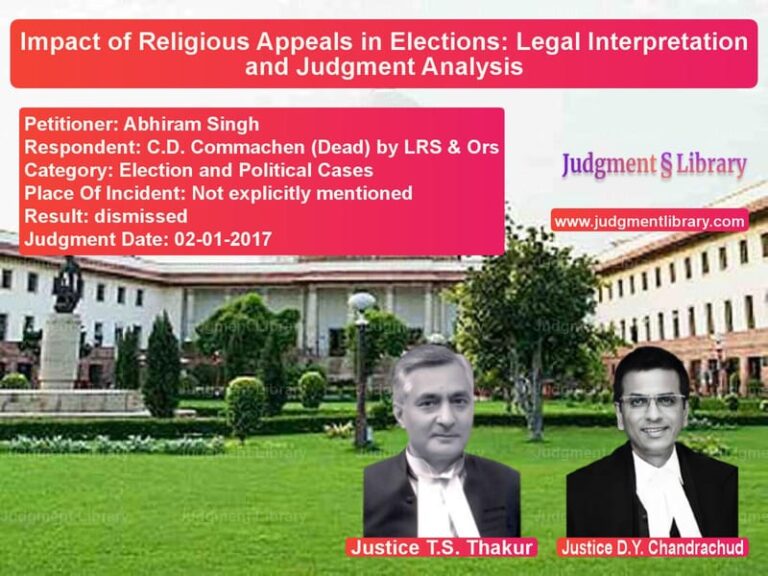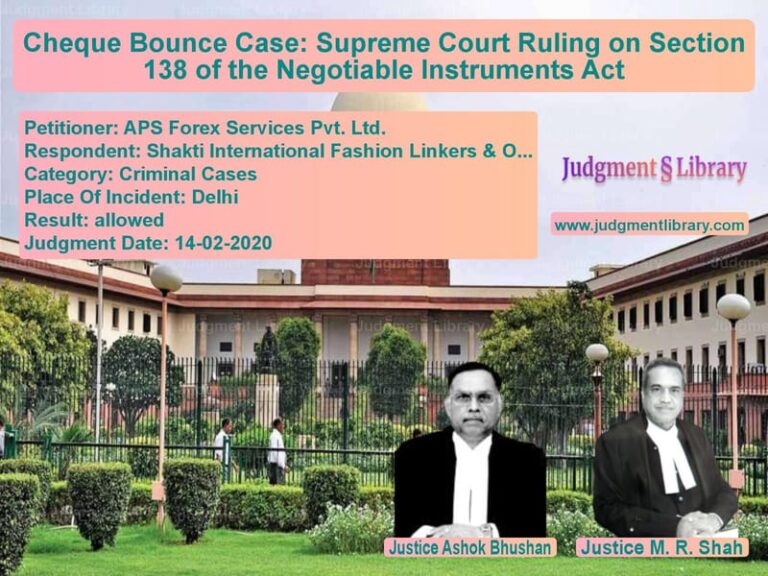Circumstantial Evidence in Murder Cases: Bikash Bora v. State of Assam
The case of Bikash Bora v. State of Assam highlights a complex criminal matter involving the death of Jugeswar Kurmi on 28th July 2001. The appellants, Bikash Bora, Atul Bora, Haren Rautia, and Dipankar Bora, were initially convicted by the Trial Court under Section 302/34 of the Indian Penal Code (IPC), which deals with murder and the involvement of multiple persons in a criminal act. However, the case is centered around the determination of whether the circumstantial evidence was sufficient to hold the appellants accountable for the murder of Jugeswar Kurmi, or if the accused were wrongly implicated. This judgment examines the role of circumstantial evidence, witness testimonies, and the chain of events leading to the death of the victim.
In the evening of 28th July 2001, Jugeswar Kurmi visited the house of Lakhiram Kurmi (PW-5) for dinner and left at around 8:30 PM. Later, Lakhiram heard commotion outside his house and observed that his dogs were barking. Upon investigating, he saw the chowkidars (the accused persons) standing near the spot where Jugeswar Kurmi had been assaulted. The witness saw the victim lying on the ground, having suffered multiple injuries, and was subsequently informed by the assailants that Jugeswar was accused of stealing tea bushes. The victim was taken to a nearby tea factory, where he was later found dead.
Petitioner’s Arguments: The appellants, led by their defense counsel, argued that the case against them was based entirely on circumstantial evidence. They questioned the reliability of the testimony provided by Lakhiram Kurmi (PW-5), the primary witness who was not an eyewitness to the crime but reached the scene after the assault had already occurred. The defense further pointed out that the Trial Court’s conviction was overly reliant on the witness’s testimony regarding the presence of the appellants at the scene of the crime and the recovery of a lathi from Dipankar Bora’s house. The appellants also contended that there was insufficient evidence to prove that they had inflicted fatal injuries on Jugeswar Kurmi.
Respondent’s Arguments: The state, represented by the prosecution, argued that despite the case being based on circumstantial evidence, the chain of events was conclusive enough to prove the involvement of the appellants in the murder. The prosecution emphasized the consistent testimonies of Lakhiram Kurmi (PW-5) and the medical evidence, which showed that the fatal injuries sustained by Jugeswar were consistent with the assault by blunt weapons, such as a lathi. The prosecution also presented the fact that a lathi used in the crime was recovered from the house of Dipankar Bora, one of the appellants, supporting the conclusion that he was involved in the attack.
Judicial Proceedings: The Trial Court convicted Bikash Bora, Atul Bora, Haren Rautia, and Dipankar Bora under Section 302/34 IPC, finding that the evidence presented was sufficient to establish their role in the crime. However, the High Court, while upholding the conviction, acknowledged that Lakhiram Kurmi (PW-5) was not an eyewitness and that the case was primarily built on circumstantial evidence. The High Court confirmed the conviction of Dipankar Bora but acquitted the other three appellants, stating that there was insufficient evidence to prove their involvement beyond reasonable doubt. This judgment was appealed by Bikash Bora, Atul Bora, and Haren Rautia, challenging their conviction, while the state did not challenge the acquittal of the other co-accused.
Supreme Court Judgment: Upon examining the case, the Supreme Court agreed with the High Court’s analysis that the case was primarily based on circumstantial evidence. The Court noted that the chain of circumstances established by the prosecution, including the presence of the appellants at the scene and the recovery of the weapon from Dipankar Bora’s house, was sufficiently strong to convict Dipankar Bora for the murder. However, the Court held that the prosecution had failed to provide conclusive evidence that Bikash Bora, Atul Bora, and Haren Rautia were involved in causing the fatal injuries to the victim. The Court ruled that the mere presence of the accused at the scene was not sufficient to establish their complicity in the murder, and therefore, they were acquitted of the charges under Section 302/34 IPC.
Key Arguments of the Court: The Court emphasized that in a case involving circumstantial evidence, the evidence must form a complete chain that points only to the guilt of the accused and excludes all reasonable doubt. The Court found that while the circumstantial evidence against Dipankar Bora was strong, the evidence against the other three appellants was not conclusive enough to link them directly to the crime. The recovery of the weapon from Dipankar Bora’s house was a critical piece of evidence that directly connected him to the attack on Jugeswar Kurmi, and the Court upheld his conviction under Section 302 IPC. However, the Court was not convinced that the remaining appellants had participated in the fatal assault, leading to their acquittal.
Conclusion: The Supreme Court’s judgment in the case of Bikash Bora v. State of Assam underscores the importance of circumstantial evidence in criminal cases. The Court reaffirmed that circumstantial evidence must be solid and complete to form a conclusive case against the accused. The acquittal of the three appellants highlights the need for clear evidence to establish the involvement of each individual in a crime. The conviction of Dipankar Bora, however, illustrates how circumstantial evidence, when properly analyzed, can be sufficient to hold an individual accountable for a serious crime such as murder.
Petitioner Name: Bikash Bora and Ors..Respondent Name: State of Assam.Judgment By: Justice A.M. Khanwilkar, Justice K.M. Joseph.Place Of Incident: Khagorijan Tea Estate, Assam.Judgment Date: 05-02-2019.
Don’t miss out on the full details! Download the complete judgment in PDF format below and gain valuable insights instantly!
Download Judgment: Bikash Bora and Ors. vs State of Assam Supreme Court of India Judgment Dated 05-02-2019.pdf
Direct Downlaod Judgment: Direct downlaod this Judgment
See all petitions in Murder Cases
See all petitions in Fraud and Forgery
See all petitions in Custodial Deaths and Police Misconduct
See all petitions in Terrorist Activities
See all petitions in Judgment by A M Khanwilkar
See all petitions in Judgment by K.M. Joseph
See all petitions in partly allowed
See all petitions in supreme court of India judgments February 2019
See all petitions in 2019 judgments
See all posts in Criminal Cases Category
See all allowed petitions in Criminal Cases Category
See all Dismissed petitions in Criminal Cases Category
See all partially allowed petitions in Criminal Cases Category







